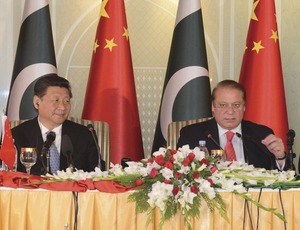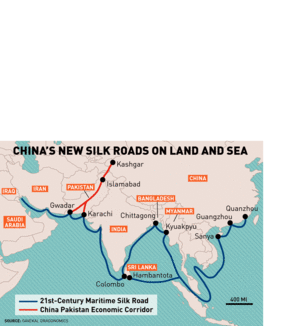Back in October 2013, when Chinese President Xi Jinping unveiled his grand plan to construct a commercial empire by creating dozens of linked infrastructure projects across 20-odd countries, politicians and construction companies the world over responded with minimal enthusiasm.
But by the end of April, the first part of the monumentally ambitious Silk Road program was underway, with Xi and his officials inking agreements on nearly a dozen infrastructure projects in Pakistan. Pakistani Prime Minister Nawaz Sharif said China had agreed to support projects worth a cool $46 billion.
Xi has been riding high since March, when several European countries, including the United Kingdom, Germany and France, pointedly ignored Washington's advice to stay away from the China- sponsored Asian Infrastructure Development Bank and agreed to become its founding members. The number of member-countries in the AIIB, the $100-billion bank that will finance projects on the Silk Road, has now risen to 56.
At the heart of the China-Pakistan Economic Corridor (CPEC), a key Silk Road segment, is an $11-billion project comprising a 2,400-kilometer-long highway and pipeline that will stretch from the Chinese border city of Kashgar to the Pakistani port of Gwadar.
The completed project would give China access to the Arabian Sea and enable it to import Middle Eastern oil to Gwadar port and then transport it overland to the border.
The remaining $35 billion is earmarked for electricity projects that will be built and owned by Chinese companies.
Easier Said Than Done
But many observers think building the corridor will not be easy because the route passes through some of the most treacherous Himalayan paths and terrorist strongholds in Pakistan's Baluchistan and northern provinces.
"I don't see this project happening in many years. Chinese workers will be exposed to serious risks in the terrorism-infested areas, and the geography is extremely difficult," Tom Miller, senior Asia analyst at research firm Gavekal Dragonomics, told ENR.
The road corridor involves broadening the Karakoram Highway, which crosses the Himalayas and connects the two countries; building phase two in the Gwadar port and constructing an international airport in Gwadar. It also would include the Karachi-Multan- Lahore Motorway Project, which involves construction of the 387-km-long Sukkur-Multan section at a cost of $2.59 billion.
Pakistan also is pushing China to help upgrade the rail network between Karachi in southern Pakistan and Peshawar in the north. A move is also afoot to lay an optic-fiber line to support Pakistan's emerging telecommunications industry.



Post a comment to this article
Report Abusive Comment